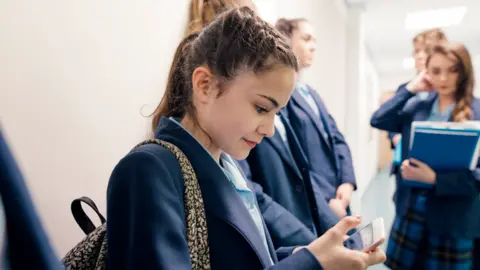Leave school phone bans to head teachers, children's commissioner says
 Getty Images
Getty ImagesBanning phones in schools should be a decision for head teachers and not "imposed nationally by the government", England's children's commissioner has said.
Nine in ten secondary schools restrict the use of smartphones, according to a survey of 19,000 schools and colleges commissioned by Dame Rachel de Souza.
Dame Rachel said children were racking up hours of screen time at home instead, and that "the people with the real power here are the parents".
Her comments come as the general secretary of the UK's largest teaching union said a government ban on phones would "take the pressure off schools".
Dame Rachel told BBC Radio 5Live that the vast majority schools were already restricting and banning phones, adding: "Blanket ban if you want, but they're doing it."
The former head teacher cast doubt on how effective a ban would be on those schools without strict policies, noting that the government can impose rules but "unless a headteacher really believes it, they won't do it properly".
A minority of schools want a ban because they are "worried about parents" not supporting the decision, she said.
"That's why I'm saying parents, 'get behind your school'."
Dame Rachel told BBC Breakfast that "parents have to remember they are not the friends of their children" but are "there to protect their children [and] put the boundaries around them."
Her survey suggests 99.8% of primary and 90% of secondary schools limit pupils' use of phones during the school day.
Most primary schools (76%) require pupils to hand in their phones or leave them in a secure place during the day, whereas most secondary schools (79%) say phones must be kept out of sight and not used.
The survey did not cover how thoroughly these policies are implemented, or their success rate.
A separate survey of 502 eight to 15-year-olds, also commissioned by Dame Rachel, suggests:
- 69% of children spend more than two hours a day on a device
- 23% of children spend more than four hours a day
"These children are not spending these hours on their phones while sat in school," Dame Rachel said in a new report.
She said schools should educate young people about online risks - but parents and carers needed more help to manage their children's online habits and technology companies must "take responsibility for making the online world safe".
She added that she would back any head teacher's decision to ban phones, but added: "It should always be their choice, based on their knowledge of what's best for the children in their own classrooms, not a direction imposed nationally by the government."
However, her report also recommended the government should "conduct more research into the potential benefits of wider restrictions on children's use of phones, particularly social media".
The Netflix drama Adolescence has raised awareness of the type of content children can be exposed to online, such as misogyny and violence, and the risks involved.
A survey commissioned by BBC News found that more than a third of secondary teachers have reported misogynistic behaviour from pupils at their school in the last week.
A government spokesperson said social media platforms already have to take down illegal material under the Online Safety Act, and the same law would soon protect children from other harmful online content.
And the government has said there is already guidance on how schools can restrict the use of phones, which head teachers can decide how to put into practice.
But Daniel Kebede, the general secretary of the National Education Union, said he believed a government ban on smartphones in schools would "assist parents, but also take the pressure off schools".
"Most schools do have rules in place, but [a ban] would create a uniformity across the school system, which would be very important and ensure that a new culture was developed in which smartphones were not in possession during school time," he said.
He said the UK should consider following in Australia's steps with a social media ban for under-16s, adding: "We have to view the online world, social media and mobile phones in the same prism as we view the tobacco companies. These are harmful to our young people and they need regulating."
